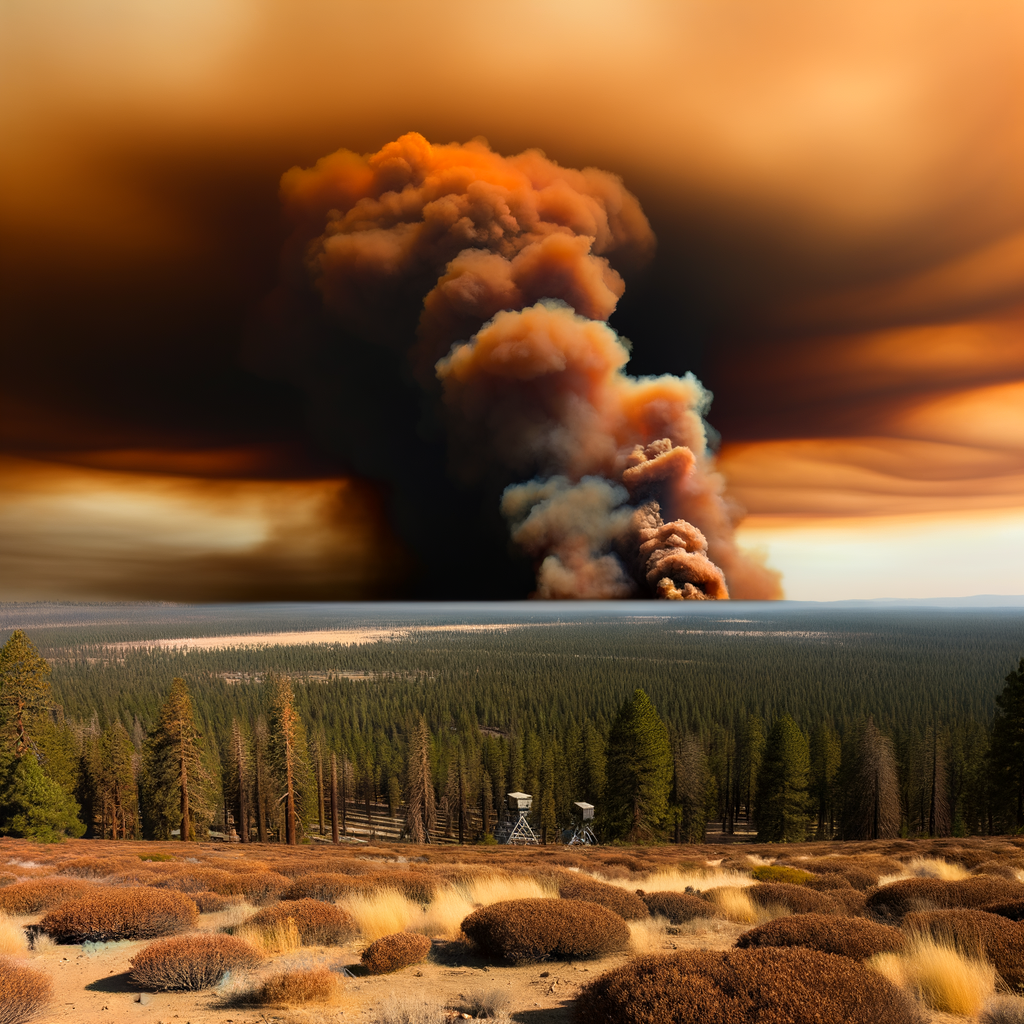Wild fire out of control
Introduction
Alright, let’s get cozy and chat about wildfires. Picture this: you're out in nature, enjoying a serene landscape, and suddenly, you see smoke billowing in the distance. That's a wildfire—a fire that starts in a wild area, like a forest or grassland, and can spread at a scary-fast pace. Wildfires typically spark from a variety of causes, some natural, like lightning strikes, and some not-so-natural, like the campfire someone forgot to put out properly. But what does it mean when we say a wildfire is "out of control"?
Well, imagine trying to pour a glass of water into a cup, but the glass has a mind of its own and decides to flood the kitchen instead. That’s kind of like an out-of-control wildfire. It’s a blaze that’s grown beyond the ability of firefighters and emergency services to manage easily. It spreads rapidly, fueled by dry conditions, wind, and plenty of vegetation to burn. When a fire reaches this stage, it can cause massive destruction to everything in its path, from trees and wildlife to homes and communities. And let’s be real, it’s a nightmare scenario for everyone involved.
In this article, we’re going to explore the fiery world of wildfires, from what causes them to how they impact our lives, and most importantly, what we can do to prevent them from turning into raging, uncontrollable beasts. So grab a seat, and let’s dive into this hot topic together!
The Causes of Wildfires
Alright, let’s talk about what really gets these wildfires going. Picture this: you're on a lovely hike, the sun is shining, and suddenly, boom—lightning strikes! Mother Nature has her own way of starting fires, and lightning is one of those natural culprits. It’s like she’s saying, “Hey, let’s shake things up a bit!” But it's not always nature's doing. Sometimes, it's us humans who unintentionally (or, unfortunately, intentionally) strike the match.
Now, let's get real for a second. Campfires are awesome, right? They bring people together for marshmallow roasting and ghost stories. But when left unattended, they can quickly become a wildfire’s best friend. It’s like leaving your party playlist on repeat—eventually, it gets out of control! And then there are those pesky cigarette butts. Tossing them out the car window might seem harmless, but they can ignite dry grass faster than you can say “smoky skies.”
Then there's arson, which is as sinister as it sounds. Some folks just want to watch the world burn, quite literally, and they set fires on purpose. It's a serious issue that adds to the chaos.
But wait, there's a plot twist! Climate change is like that villain in the background, making everything worse. Warmer temperatures, prolonged droughts, and those pesky winds create a perfect storm for wildfires to thrive. It’s like giving them a VIP pass to go wild. The Earth is heating up, and so are the chances of these fires going rogue.
So, next time you’re out and about, enjoying the great outdoors, remember: a little caution goes a long way. Whether it’s keeping an eye on that campfire or properly disposing of cigarette butts, we can all play a part in keeping those wildfires in check. After all, nobody wants to see their favorite hiking trail turn into a scene from a disaster movie!
The Impact of Out-of-Control Wildfires
Alright, let's chat about what happens when wildfires go rogue. Imagine a wildfire as a party crasher that was never invited, and now it's overstaying its welcome in the worst possible way. These out-of-control wildfires don't just roast marshmallows; they roast entire ecosystems, communities, and sometimes, our health!
First off, the environmental consequences are pretty dire. Picture a lush forest teeming with life, from the smallest insects to majestic trees reaching for the sky. An out-of-control wildfire can wipe that out faster than you can say "smores." We're talking loss of biodiversity, folks. Animals lose their homes, plants get charred, and the soil? Well, it becomes as useful as burnt toast. Without vegetation to hold it together, soil erodes easily, leading to landslides and a whole bunch of other problems that nobody signed up for.
Now, let's talk money — because wildfires don't just burn trees; they burn holes in pockets. Communities hit by wildfires suffer massive economic blows. Think about all those houses, businesses, and infrastructure that get reduced to ashes. Rebuilding is not cheap, and the loss of livelihoods in those areas can be devastating. From tourism to agriculture, the ripple effect is huge. Plus, insurance premiums in fire-prone areas can skyrocket, making it even harder for folks to recover and rebuild.
And then there's the air we breathe. Ever smelled wildfire smoke? It's like breathing in a barbecue that went horribly wrong. Wildfire smoke is packed with tiny particles that can sneak into your lungs and wreak havoc. Health risks are real, especially for kids, the elderly, and those with respiratory issues. Hospitals see a spike in visits, and air quality warnings become as common as weather forecasts. It's like nature's way of telling us to take a rain check on outdoor activities.
So, what’s the takeaway? Out-of-control wildfires are more than just flames and smoke. They affect the environment, economy, and our health in ways that are hard to ignore. It's a fiery reminder that we need to take action — not just to put out the flames but to prevent them from starting in the first place.
Case Studies: Notable Out-of-Control Wildfires
Let's take a hot minute to talk about some of the wildfires that have made headlines around the globe. These fires didn't just burn; they roared like a lion with a thorn in its paw. And while the stories are fascinating, they also teach us a lot about what goes wrong when a fire gets out of control.
First up, the 2019-2020 Australian Bushfires, also known as the "Black Summer." This wasn't just a wildfire; it was a fiery beast that devoured nearly 46 million acres. That's like burning an area the size of North and South Dakota combined! The fires were fueled by a deadly cocktail of extreme heat, prolonged drought, and those infamous Aussie winds. When you mix these ingredients, you get a recipe for disaster. The fires taught us the harsh lesson of how climate change can amplify natural conditions, turning a typical fire season into an inferno.
Then, there's the Camp Fire of 2018 in California, a name that sounds deceptively cozy but was anything but. It was the deadliest and most destructive wildfire in California's history, wiping out the town of Paradise. Imagine waking up one day to find your entire town gone – it's heart-wrenching. This fire was a grim reminder of the importance of maintaining infrastructure, as it was sparked by a faulty electrical transmission line. It highlighted how human error and aging infrastructure can turn a fire into an uncontrollable monster.
Let's not forget the Amazon Fires of 2019. The Amazon, often called the "lungs of the Earth," was on fire, and it was a global wake-up call. These fires were largely man-made, set to clear land for agriculture. But they spiraled out of control, leading to international outcry. The lesson here? We need to balance economic activities with environmental stewardship. Otherwise, we risk losing vital ecosystems.
So, what did we learn from these fiery tales? Well, for one, prevention is key. It’s like the old saying goes: an ounce of prevention is worth a pound of cure. We also learned that global cooperation is crucial. Fires don't respect borders, and neither should our efforts to fight them. Lastly, these case studies show us that while we can't control Mother Nature, we can certainly be better prepared to respond when she throws a fiery tantrum.
Prevention and Mitigation Strategies
Alright, let's talk about prevention and mitigation because, honestly, who doesn't want to stop a wildfire before it turns into a blazing monster? First off, picture this: a controlled burn. It sounds kind of paradoxical, right? But it's actually a crucial strategy. By intentionally setting small, manageable fires, we can clear out the underbrush and deadwood that could otherwise act like kindling for a much larger, uncontrollable wildfire. It's like cleaning out your closet to prevent an avalanche of clothes every time you open the door!
Now, let's not forget about the forest management folks. They're like the unsung heroes of the woods, working tirelessly to maintain healthy forests. This can mean thinning out trees, removing invasive species, and even planting fire-resistant vegetation. It's all about creating a balanced ecosystem that can withstand a little heat without going up in flames.
Community preparedness is another biggie. Imagine if everyone in a neighborhood knew exactly what to do if a wildfire was heading their way. Evacuation plans, emergency kits, and staying informed can make a world of difference. Plus, community education programs can teach everyone from kids to grandparents about fire safety practices. It's like a neighborhood watch, but for wildfires!
And oh, technology! We've got some pretty cool gadgets in our wildfire-fighting arsenal these days. Drones and satellite imagery are being used to detect fires early, giving us a head start in tackling them. Plus, there are apps now that can alert you if there's a fire nearby, so you can stay safe and informed. It's like having a firefighter in your pocket!
So, while we can't completely eliminate wildfires—because, let's face it, nature's gonna nature—we can definitely take steps to keep them from spiraling out of control. And it all starts with a little bit of planning, some nifty technology, and a whole lot of community spirit. Let's keep those fires where they belong: in the fireplace, not the forest!
The Role of Firefighters and Emergency Services
Let’s talk about the real-life superheroes—firefighters and emergency services. These folks are out there, often in the most grueling and dangerous conditions, battling wildfires that seem to have a mind of their own. Imagine facing a wall of flames, heat so intense it feels like standing inside an oven, and winds that can change direction in an instant. It's not just physically demanding; it's mentally exhausting too. Firefighters have to make split-second decisions that can mean the difference between life and death, not just for them, but for entire communities.
One of the biggest challenges they face is the sheer unpredictability of wildfires. A fire that seems to be under control can suddenly flare up with a gust of wind. And let's not forget about the terrain—steep hills, dense forests, and remote locations that are tough to access. These conditions require firefighters to be not only brave but also incredibly adaptable. They often work long hours with little rest, fueled by adrenaline, determination, and maybe a little too much coffee!
Coordination is key when dealing with these fiery beasts. It's not just about the firefighters on the ground. You've got air support, local law enforcement, medical teams, and sometimes even the military, all working together like an intricate dance. Communication is crucial, and it's amazing to see how these teams coordinate everything, from water drops from helicopters to evacuations of entire towns. It’s like a well-oiled machine, but with the stakes cranked up to the max!
And then there are the stories—oh, the stories of bravery and resilience. Like the time when a firefighter saved a family of deer trapped in a blaze, or when a crew held the line to protect a small town, refusing to give an inch even when the fire seemed unstoppable. These tales remind us that, despite the chaos, there's a human heart beating at the center of every firefight.
So, next time you see a firefighter, maybe give them a nod or a thank you. They're out there on the front lines, protecting lives, homes, and the environment from the relentless threat of wildfires. They're the unsung heroes, and boy, do they deserve all the respect and gratitude we can muster!
The Future of Wildfire Management
Alright, folks, buckle up because the future of wildfire management is going to be a wild ride! (Pun totally intended.) As we peer into our crystal ball, it’s clear that the way we tackle these fiery beasts needs a serious upgrade. With wildfires becoming more frequent and intense, the old methods just aren’t cutting it anymore. We need policies and regulations that are as dynamic as the fires themselves.
First off, let’s talk about policies. We need them to be as flexible as a yoga instructor doing the splits. With climate change altering the game, our rules and regulations have to keep pace. This means updating zoning laws, improving building codes, and ensuring that land management practices consider the new normal. It's not just about putting out fires anymore—it's about being smart about where and how we build our communities.
Now, let’s get into the cool stuff: technology. Imagine having an AI buddy that can predict where a fire might start, based on weather patterns, moisture levels, and even historical data. Sounds like sci-fi, right? But it's not! Artificial intelligence and satellite monitoring are already making waves in wildfire management. These technologies can provide real-time data, allowing us to act faster and more efficiently. It's like having a superhero sidekick that never sleeps!
But here’s the kicker: no nation can tackle this alone. Wildfires don’t respect borders—they’re the ultimate party crashers. This means we need some serious global teamwork. Countries need to share resources, data, and strategies. Think of it like a massive international fire-fighting squad, where everyone brings their best game to the table.
In a nutshell, the future of wildfire management is all about being proactive, tech-savvy, and team-oriented. With the right mix of updated policies, cutting-edge technology, and global cooperation, we can turn the tide against these raging infernos. So, let’s gear up, folks. The future is bright, and hopefully not because of the flames!
Wildfires are a force of nature that demand our attention, and as we've explored, they're not just a problem for the forests anymore; they're a global challenge impacting our environment, economy, and health. Remember when Smokey Bear said, "Only you can prevent forest fires"? Well, turns out, he was onto something! We've covered a lot of ground, from the causes and impacts to the heroic efforts of firefighters and the innovative tech that's helping us tackle these blazing beasts.
The big takeaway? Wildfires aren't going away anytime soon, but we can certainly get smarter about how we deal with them. Whether it's through better policies, cutting-edge technology, or simply being more mindful when we're out in nature, every little bit helps. We all have a role to play in prevention and preparedness. So, next time you're out in the woods, remember to double-check that campfire and maybe skip the fireworks—trust me, the forest will thank you!
It's crucial for us to stay informed and ready. Wildfires may be wild, but with the right knowledge and actions, we can keep them from spiraling out of control. Let's work together to protect our planet, our homes, and our health from these fiery foes. Stay safe, stay smart, and let's keep the flames at bay!






